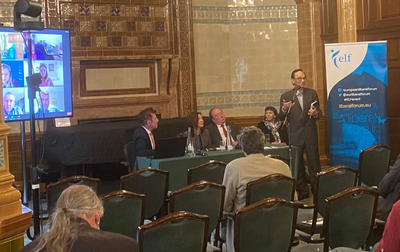Do you Dare to Debate the Rise of China?
"This House Believes China is interested in co-existence rather than domination".

True to the European Liberal Forum (ELF)'s ethos of encouraging open and informed discussions, the Oxford-union style debating format was an inspired choice for the controversial topic of China's future world domination.
The event held on 30 September was hosted by the Paddy Ashdown Forum, a centrist thinktank based in the UK and a member of ELF. Chris Gleadle, CEO of PAF welcomed participants to the hybrid event held both physically at the National Liberal Club in London as well as being live-streamed.
To set the scene, Dr Antonios Nestoras, Head of Policy and Research of ELF spoke of the history and tradition of European debates crucial in response to crisis. It was important for us to understand what China wants and needs in order to formulate EU's own foreign policies and military objectives which are not dependent on other actors.
The first debater for the motion was Laia Comerma of LYMEC, joining the meeting virtually from Barcelona. She spoke eloquently drawing on her research experience as a PhD candidate in International Relations at the Univ Pompeu Fabra and as researcher at the Barcelona Institute of International Studies. In history, China was not a colonizer and has only recently shaken off the so-called century of humiliation. China, she posited, is the largest exporter in the world and her weapon is money and trade, and not war.
Speaking against, Rebecca Tinsley, former BBC reporter, author and activist in Africa, strongly disputed the motion. With convincing slides, she presented the case for China's world domination via the Belt and Road Initiative, its signature foreign policy. Opaque financial arrangements in complex infra-structural projects were described as white elephants and debt-traps which have allowed China to dominate and influence weaker developing nations. She recommended that Europe offers Africa an alternative to China with more sustainable development, livable cities and quality education.
Up next for the motion was Prof Michael Mainelli, founder of Z/Yen financial think tank in the City of London which promotes societal advancement through better finance and technology. Whilst he did not disagree with criticisms of China's BRI, he suggested that China is not in fact as strong as the West feared. There were problems with an ageing population, structural inefficiencies and a looming shadow banking crisis. In fact, China despite its ancient history was now a young nation working out its role and contribution within multi-lateral institutions.
To wrap up the debate against the motion, we had Dr Tomasz Kaminski, assistant professor at the Dept of Asian Studies, Univ of Lodz in Poland, a leading light in the field of para-diplomacy, and who has developed the concept of gamification and game-based learning. He argued that China is already dominating the world in technology, producing over a million engineers a year. Within Europe, China is practicing the age-old divide and rule as a foreign policy and questioned the premise that it has no ambitions of empire.
The debate was co-moderated by Merlene Toh Emerson and Paul Reynolds who managed to engage members of the audience through 2 polls taken before and after the debate. Whilst the physical audience were fairly evenly balanced in their votes, the virtual audience were more persuaded by the arguments against the motion. However, many more abstained; perhaps the jury is still out on this? Dr Yeow Poon, Chair of Chinese Liberal Democrats provided final closing remarks, expressing an aspiration for peaceful co-existence, a sentiment which many of us share.
Thanks to ELF for hosting this vibrant and interesting debate, the first of a series.
